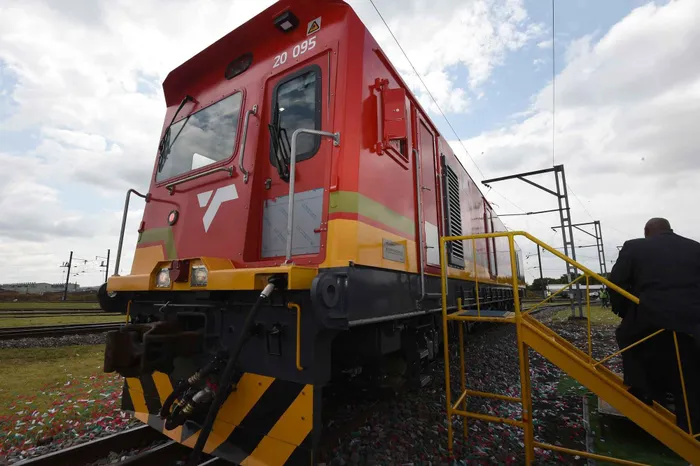
The new train operating companies (TOCs) are poised for operation within a timeframe that varies from the second half of 2026 to as late as 2028, reflecting a broader ambition to ramp up freight rail volumes from the current 160 million tons to a targeted 250 million tons by 2030.
Image: Kopano Tlape
Banele Ginidza
Transnet has announced the formation of a leasing company to facilitate the refurbishment of its rolling stock, welcoming the entrance of 11 new private sector operators onto its rail network.
This comes after Transport Minister Barbara Creecy on Friday announced that she has approved the
selection of new train operating companies, a major milestone in South Africa’s rail reform programme.
Michelle Phillips, CEO of Transnet, confirmed these developments over the weekend, illustrating a determined response to alleviate a significant shortfall of 90 million tons in freight capacity expected by the latter half of next year.
The new train operating companies (TOCs) are poised for operation within a timeframe that varies from the second half of 2026 to as late as 2028, reflecting a broader ambition to ramp up freight rail volumes from the current 160 million tons to a targeted 250 million tons by 2030.
This ambitious leap aims to bridge the anticipated 90 million-ton gap with the help of these private entrants, emphasizing their potential in revitalising rail logistics in the region.
A breakdown of the applications reveals ambitious intentions across various transport corridors, with a total of 41 routes sought.
Notably, six new entrants have applied for 15 routes along the North Corridor for transporting coal and chrome, while the Iron Ore Corridor features one applicant aiming for a single route dedicated to iron ore transport.
The Cape Corridor sees two new entrants proposing to cover manganese, and significant interest is also noted in the Northeast Corridor with six applicants vying for 16 routes, catering to coal, chrome, magnetite, fuel, and containers.
Phillips noted that while some TOCs have proactively approached Transnet for rolling stock, a comprehensive agreement was needed to facilitate this arrangement.
"Some of these train companies have approached us and there are instances where we have made rolling stock available. We need to negotiate agreements with them. We have a fleet in the country that requires some work and refurbishment, and my understanding is that the Train Operating Companies will also do the necessary work to fund themselves and also access other markets for rolling stock," Phillips said.
"In the meantime, what we have done [is that] we have been entering applications from some of these new Train Operating Companies for rolling stock. We got 14 applications for rolling stock, we are working with them, negotiating with them to see what is possible, what it is we can make available to them, they will need to refurbish some of the stock through Tactical Leasing arrangement."
The African Rail Industry Association (ARIA) welcomed this decisive move, which they believe is essential to inducing private investment and efficiency into rail operations.
ARIA’s CEO, Mesela Nhlapo, emphasised the potential for the new operators to collectively transport an estimated 20 million tons per annum, highlighting that these efforts were critical in closing the existing gap between current performance and the national freight targets.
"These new TOCs will carry an estimated 20 million tons per annum (mtpa). This provides a critical first step in closing the gap between the current performance of around 160mtpa and the national target of 250mtpa by 2029.
"ARIA believes this step will maximise the use of the rail network, unlock latent capacity and create a more competitive and efficient logistics backbone for South Africa."
Nhlapo also said the policy encouraged investment in rolling stock, which could unlock as much as R100 billion and was key to invigorating localisation.
Meanwhile, Phillips said Transnet had existing plans and capital budgets for upgrading and maintaining the network.
She said it would also be seeking to supplement that funding through applications to the National Treasury’s Budget Facility for Infrastructure (BFI), which would be holding more regular bid windows.
Transnet had applied for R16.4bn from the BFI in July, R10bn of which was to fund upgrades to the North and Ore corridors and the balance for port development in Durban and Ngqura. It is also preparing a second BFI submission for R18.6bn in October.
BUSINESS REPORT